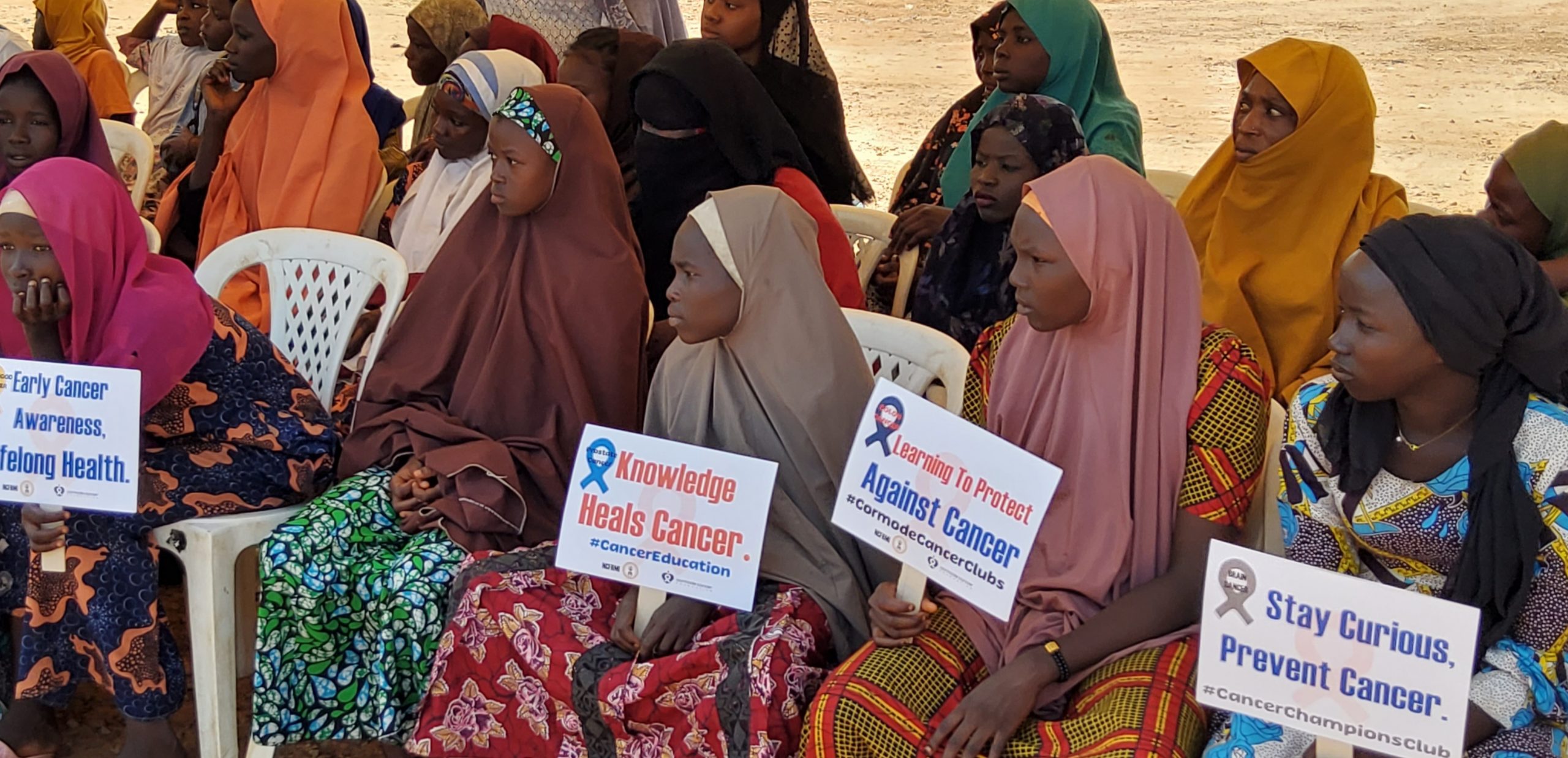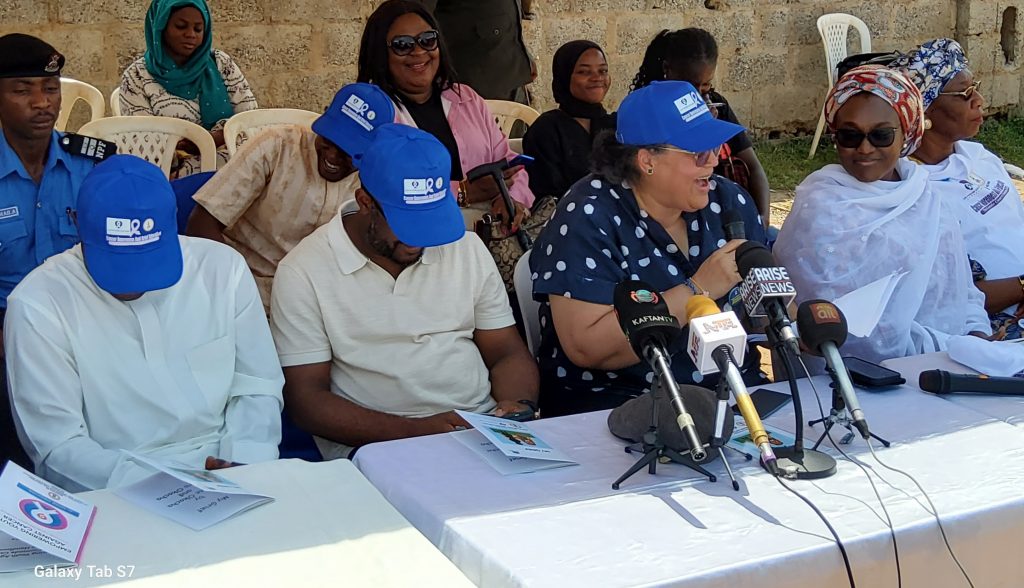Health
Over 200 IDPs Benefit from NCFRMI, Cormode Cancer Foundation Cancer Awareness Initiative for women, Girls in FCT

By Joel Ajayi
More than 200 internally displaced persons (IDPs) participated in a cancer awareness campaign organized by the National Commission for Refugees, Migrants, and Internally Displaced Persons (NCFRMI) in collaboration with the Cormode Cancer Foundation. The initiative aimed to educate young people about cancer prevention and early detection.
During the awareness program held for IDP women and girls at the Durumi IDP camp, Tijani Aliyu, the Federal Commissioner for the Commission, emphasized that the initiative would enhance the health and well-being of displaced persons, reduce the stigma associated with cancer, and empower young people to become advocates for cancer awareness.
“When you provide information, you provide knowledge for the younger generation at an early stage, which means 50% of the problem is being solved,” Aliyu stated. “That’s why we have chosen to focus on children. Cancer is a deadly disease, and this awareness initiative aims to equip young people with the understanding they need about what cancer is.”
He added, “I hope the knowledge we impart today will help our children better understand cancer. We will not stop here; we have over 100 campaigns across the nation, and we will ensure that IDPs and refugees benefit from this opportunity.”
Aliyu commended the Cormode Cancer Foundation for their partnership, which aligns with the Commission’s goal of improving the health and well-being of displaced persons.
“We are delighted to partner with the Cormode Cancer Foundation to address the critical issue of cancer awareness in our IDP camps and host communities. By educating the youth about cancer, we aim to foster a healthier future and reduce the stigma associated with this disease.”
He, however said that the commission will not spare any resources toward well being of IDPs, Refugees in the Country: “We are not going to stop here,we have more than 100 IDPs across the nations, we will make sure that we cover all to ensure the IDPs and Refuge benefit from this opportunity.”
In her address, Dr. Denise Ejoh, founder of the Cormode Cancer Foundation, explained that the project is dedicated to making a difference in the lives of those affected by cancer, particularly in vulnerable communities. “If we don’t teach children early about cancer, who will inform them when they or their communities are affected? Currently, one in two people will be diagnosed with cancer worldwide,” she remarked.
Dr. Ejoh continued, “This campaign is now a global initiative, encouraging better knowledge of cancer among everyone. If you teach children, they will educate their parents. Teaching children about cancer can significantly improve their ability to recognize it early if it arises in their lives.”
During the event, the Cormode Foundation launched the Cormode Cancer Champions Clubs in secondary schools across the country to further educate young people about cancer prevention and early detection. Dr. Ejoh revealed that the clubs will serve as platforms for disseminating critical information, providing emotional support, and fostering a community of informed and proactive individuals.
Health
Stakeholders Applaud A360 Impact On Adolescent Health

Stakeholders in Nigeria’s health and development sector say the institutionalisation and scale-up of the Adolescent 360 (A360) Amplify project have greatly improved adolescent sexual and reproductive health outcomes in participating states.
They made this known at a dissemination meeting on the project on Thursday in Abuja.
It was implemented by the Society for Family Health (SFH) and partners, and later adopted into government systems following documented successes.
Launched in 2020, the A360 project was designed to provide adolescent girls with access to sexual and reproductive health information, youth-friendly services and economic empowerment opportunities.
The programme was implemented in Kano, Jigawa, Kaduna and Nasarawa States using a human-centred design approach that engaged governments, communities and young people to improve uptake of family planning and maternal health services.
Dr Aisha Sadiq, Permanent Secretary, Kaduna State Ministry of Health, said institutionalising A360 had delivered measurable improvements in adolescent health indicators and community wellbeing.
She said Kaduna currently provides A360 youth-friendly services in 623 Primary Health Care (PHC) centres.
The Matasan Mata Arewa (MMA) initiative, she added, had reached 75 communities and empowered more than 15,000 girls with entrepreneurship skills and seed capital.
According to her, more than 60,000 girls have accessed contraceptives through the programme, with a reduction in discontinuation rates as more young women sustain use and transition to maternal and child health services.
“These changes have shown a marked reduction in maternal mortality among those communities. It has also reduced negative neonatal outcomes,” she said.
Sadiq recounted an elderly woman’s remarks from a programme community, calling them a strong reflection of the project’s success.
“These girls have spent their whole lives believing they will remain tolerable liabilities to the husbands they marry, but now they are realising the value of becoming appreciated assets,” she quoted.
Sadiq added that Kaduna’s 16 per cent health budget allocation and the integration of A360 activities into the state’s 2025 Annual Operational Plan demonstrated sustained political commitment.
Also speaking, Dr Omokhudu Idogho, Managing Director, SFH, said the four implementing states had successfully embedded A360 approaches into government systems, community structures and routine health practices.
He was represented by Dr Kenechukwu Erichalo, Deputy Managing Director, Project Delivery.
Idogho said the project had reached more than one million adolescent girls with family planning services and engaged over 500,000 others with comprehensive sexuality education messaging.
“We recorded more than 50,000 antenatal care visits, ensuring that girls received skilled care that saved lives, and supported over half a million girls to learn income-generating skills,” he said.
He said A360 pioneered the MMA and Niger Girls models, demonstrating that culturally sensitive, human-centred programmes can succeed even in conservative communities.
“Our most significant achievement is institutionalisation. Today, all 1,750 A360-supported facilities are fully government-led,” he added.
Mrs Roselyn Odeh, A360 Project Lead, said the initiative was developed in response to poor adolescent health indices in the country.
She said the programme ensured respectful, youth-friendly services at PHCs and supported school reintegration and entrepreneurship for girls.
She said the decision to scale the programme in northern states was based on data.
“When you look at maternal mortality among young people, you know the section of the country it is coming from. Data drove our decisions in alignment with government priorities,” she said.
Odeh identified challenges including weak PHC infrastructure, funding gaps, commodity shortages and the need to engage husbands in conservative communities.
“But creatively, we worked with governments to mobilise domestic funding through health revolving funds and the Basic Healthcare Provision Fund,” she said.
Mr Sagir Musa, Commissioner for Youth, Jigawa State, assured of continued commitment from implementing states to sustain and expand the project’s gains.
“This project may be nearing closure, but for us, it has just begun. We have gone beyond its life cycle to embed its approaches in the things we do,” he said.
The dissemination meeting brought together policymakers, community leaders, development partners and beneficiaries to review lessons learned and outline future priorities for scaling adolescent health interventions nationwide.
(NAN)
-

 Featured6 years ago
Featured6 years agoLampard Names New Chelsea Manager
-

 Featured6 years ago
Featured6 years agoFG To Extends Lockdown In FCT, Lagos Ogun states For 7days
-

 Featured6 years ago
Featured6 years agoChildren Custody: Court Adjourns Mike Ezuruonye, Wife’s Case To April 7
-

 Featured6 years ago
Featured6 years agoNYSC Dismisses Report Of DG’s Plan To Islamize Benue Orientation Camp
-

 Featured4 years ago
Featured4 years agoTransfer Saga: How Mikel Obi Refused to compensate me After I Linked Him Worth $4m Deal In Kuwait SC – Okafor
-
Sports3 years ago
TINUBU LAMBAST DELE MOMODU
-

 News11 months ago
News11 months agoZulu to Super Eagles B team, President Tinubu is happy with you
-
Featured6 years ago
Board urges FG to establish one-stop rehabilitation centres in 6 geopolitical zones

